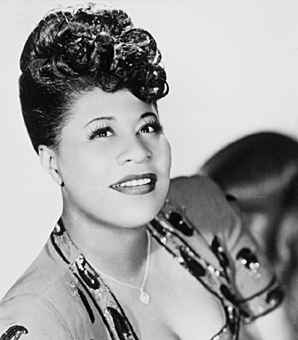|
 Fitzgerald, Ella (1917-1996), American jazz singer, considered one
of the greatest singers in jazz history. Fitzgerald achieved spectacular
success in bringing jazz into mainstream American culture and was
rightly dubbed the "First Lady of Song." In a career that spanned
almost 60 years, she demonstrated the artistic potential in American
popular songs, created a body of enduring recorded art, and influenced
countless other singers through her jazz stylings and scat singing
(improvised nonsense syllables usually sung to instrumental accompaniment).
Born in Newport News, Virginia, Fitzgerald moved as a child with her
mother and her stepfather to Yonkers, a suburb of New York City. At
first she hoped to become a dancer. But she loved the singing of Connee
Boswell, who performed in a vocal trio. As a teenager, she began winning
amateur talent contests at the Harlem Opera House and its nearby competitor,
the Apollo Theater, in New York City's Harlem neighborhood. This recognition
led to an invitation to sing with noted drummer and bandleader Chick
Webb and his band at the Savoy Ballroom in Harlem. Upon Webb's death
in 1939, Fitzgerald became leader of the band. Then, in 1941 she went
out on her own during a time when other big-band singers� Frank Sinatra,
Jo Stafford, and others�were also stepping into the limelight. By
the 1940s Fitzgerald had established the style that made her famous:
a warm and lovely voice, unfailingly accurate pitch, superb clarity
of diction, and an irresistible sense of swing. Fitzgerald sang many
song styles with authority. In the 1950s she began a series of songbook
recordings, in which she interpreted classic songs by Irving Berlin,
George Gershwin and Ira Gershwin, Cole Porter, and other American
composers and lyricists. These recordings set high standards for the
interpretation of such ballads as "The Man I Love" and "How Long Has
This Been Going On?" Noted for her virtuosic scat singing (prominently
featured in "How High the Moon" and "Mack the Knife"), she used her
voice with all the improvisatory genius of the finest jazz instrumentalists.
She also made collaborative recordings with such well-known bandleaders
as Louis Armstrong, Duke Ellington, and Count Basie, among others.
By the 1950s Fitzgerald was becoming an international celebrity. She
topped one musical popularity poll after another and made several
television appearances. By the 1960s Fitzgerald's graceful public
presence and musical artistry had made her a beloved figure on the
American cultural scene. She earned 14 Grammy Awards (including a
Lifetime Achievement Award in 1967), a number of honorary doctorates,
and other prizes, and she gave generously to charitable and humanitarian
causes. In 1997 Fitzgerald's son and attorney presented her archives
to the Smithsonian Institution in Washington, D.C., which in 1998
opened an exhibition on her life and contributions.
Fitzgerald, Ella (1917-1996), American jazz singer, considered one
of the greatest singers in jazz history. Fitzgerald achieved spectacular
success in bringing jazz into mainstream American culture and was
rightly dubbed the "First Lady of Song." In a career that spanned
almost 60 years, she demonstrated the artistic potential in American
popular songs, created a body of enduring recorded art, and influenced
countless other singers through her jazz stylings and scat singing
(improvised nonsense syllables usually sung to instrumental accompaniment).
Born in Newport News, Virginia, Fitzgerald moved as a child with her
mother and her stepfather to Yonkers, a suburb of New York City. At
first she hoped to become a dancer. But she loved the singing of Connee
Boswell, who performed in a vocal trio. As a teenager, she began winning
amateur talent contests at the Harlem Opera House and its nearby competitor,
the Apollo Theater, in New York City's Harlem neighborhood. This recognition
led to an invitation to sing with noted drummer and bandleader Chick
Webb and his band at the Savoy Ballroom in Harlem. Upon Webb's death
in 1939, Fitzgerald became leader of the band. Then, in 1941 she went
out on her own during a time when other big-band singers� Frank Sinatra,
Jo Stafford, and others�were also stepping into the limelight. By
the 1940s Fitzgerald had established the style that made her famous:
a warm and lovely voice, unfailingly accurate pitch, superb clarity
of diction, and an irresistible sense of swing. Fitzgerald sang many
song styles with authority. In the 1950s she began a series of songbook
recordings, in which she interpreted classic songs by Irving Berlin,
George Gershwin and Ira Gershwin, Cole Porter, and other American
composers and lyricists. These recordings set high standards for the
interpretation of such ballads as "The Man I Love" and "How Long Has
This Been Going On?" Noted for her virtuosic scat singing (prominently
featured in "How High the Moon" and "Mack the Knife"), she used her
voice with all the improvisatory genius of the finest jazz instrumentalists.
She also made collaborative recordings with such well-known bandleaders
as Louis Armstrong, Duke Ellington, and Count Basie, among others.
By the 1950s Fitzgerald was becoming an international celebrity. She
topped one musical popularity poll after another and made several
television appearances. By the 1960s Fitzgerald's graceful public
presence and musical artistry had made her a beloved figure on the
American cultural scene. She earned 14 Grammy Awards (including a
Lifetime Achievement Award in 1967), a number of honorary doctorates,
and other prizes, and she gave generously to charitable and humanitarian
causes. In 1997 Fitzgerald's son and attorney presented her archives
to the Smithsonian Institution in Washington, D.C., which in 1998
opened an exhibition on her life and contributions.
|